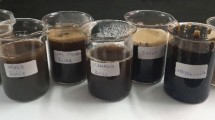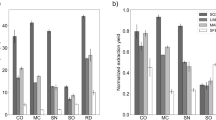Abstract
‘QUICK decline’, a devastating virus infection of orange trees, was first found to be present in southern California in 1939, and by 1952 it had spread to six of the fourteen counties in which oranges are grown in California. Inoculation tests1 demonstrated that tolerance to the virus varies with the variety of the rootstock on which the sweet orange is growing, and that the disease is likely to be fatal only if the rootstock is that of the sour orange (Citrus aurantium L.). Because of this scion-rootstock relationship to the seriousness of the disease, which in one form or another is widely spread throughout the citrus-growing areas of the world, a method for the detection of the sour orange rootstock in established orchards is of considerable significance.
This is a preview of subscription content, access via your institution
Access options
Subscribe to this journal
Receive 51 print issues and online access
$199.00 per year
only $3.90 per issue
Buy this article
- Purchase on Springer Link
- Instant access to full article PDF
Prices may be subject to local taxes which are calculated during checkout
Similar content being viewed by others
References
Bitters, W. P., and Parker, E. R., Agric. Exp. Stat., Univ. Calif., Berkeley, 6, (4), 10 (1952).
Selle, R. M., Citrus Leaves, 34, 6 (1954).
Author information
Authors and Affiliations
Rights and permissions
About this article
Cite this article
SELLE, R. Determination of Sour Orange Rootstock by Paper Chromatography. Nature 174, 140–141 (1954). https://doi.org/10.1038/174140a0
Issue Date:
DOI: https://doi.org/10.1038/174140a0
This article is cited by
Comments
By submitting a comment you agree to abide by our Terms and Community Guidelines. If you find something abusive or that does not comply with our terms or guidelines please flag it as inappropriate.



